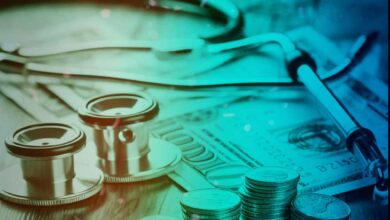How does expenditure turn into health?
The Gulf raised budgets and achieved outcomes

The Gulf States put the citizens’ health at the top of their priorities. Therefore, special attention has been given to the health sectors. In the past years, the health sector kept pace with the accelerating health developments globally while facing the coronavirus pandemic, which exhausted many countries around the world. In order to achieve this, the Gulf countries have been increasing the budget allocations to the health sector year after year. Expenditures have been increased in hospitals and health facilities that provide citizens with top-notch healthcare and optimal care and protection.
The Global Health Security Index (GHS Index) stated the Gulf countries’ plans to increase healthcare spending, as spending in 2017 was about $76 billion, and is expected to exceed $104 billion by the end of 2022. According to the World Bank, the overall government expenditure on the healthcare sector was 45% of the total size of the economy. Two years ago, there were 118,000 beds in Gulf hospitals, and they are expected to reach 123,000 beds by the end of 2022. In the midst of this utmost care given to the health sector, four Gulf countries ranked among the best in local and international studies indicators in the field of health service, sector development and expenditure volume.
Qatar: Expenditures to improve the quality of the sector
Qatar is ranked fifth in the Health Index by the London-based Legatum Institute, thanks to improved life expectancy and health outcomes for patients and a high level of investment in health infrastructure.
This progress, which was ranked 13th in the Middle East by the UAE, is ranked first in the Middle East in terms of life expectancy and is among the top 25 in terms of quality of health services and access to healthcare. Qatar is the only country in the region to secure its top five positions on Singapore’s annual prosperity index, followed by Luxembourg, Japan and Switzerland. The country’s spending in the region’s top healthcare sector was 22.7 billion riyals in healthcare in 2018, up 4 percent from the previous year.
The Minister of Public Health Dr. Hanan Mohammed Al-Kuwari said: “The State of Qatar has invested heavily in the health sector under the wise leadership of His Highness Sheikh Tamim Bin Hamad Al Thani, Emir of the country.” The first place on the international index reflects the State’s commitment to health-system priorities designed to meet the needs of future generations and to improve the health of the population at present, she confirmed.
Qatar scored highly on its e-health readiness as well as site quality. In 8 out of 10 quality categories measured by the authors, Qatari websites scored higher than the GCC average. The team of researchers stressed that Qatar is now uniquely placed to take a leading role in Internet-based health information in the region. Factors such as Qatar’s high Internet connectivity and penetration rates, planned broadband infrastructural upgrades, a positive youth attitude towards technology, and health sector improvements are all valuable assets for future development of e-health in Qatar.
Regarding the development of spending in the State’s health budget, expenditure allocations for major projects in the year 2020 increased by 0.6% to reach 90 billion riyals, compared to 89.5 billion riyals for Qatar’s budget in the fiscal year 2019.
The total allocations for the health sector in the general budget amounted to approximately 22.6 billion riyals, which represents 11% of the total expenditures. The most important projects in the healthcare development field that the country is currently witnessing include expansions of Hamad Medical Corporation’s hospitals and facilities as well as the establishment of new primary care centers.
In 2021, the government continued to focus on the education and health sectors, as the allocations for the sector are estimated at 16.5 billion riyals, which include more major projects in the healthcare development field and the expansion of approved medical and health facilities for the next year. Qatar Chamber’s Chairman HE Sheikh Khalifa bin Jassim Al Thani said: “The new budget reflects the power of the Qatari economy, despite the coronavirus pandemic and its repercussions related to the precautionary measures against the virus outbreak, as the budget included continued spending on major projects, as well as the allocation of large sums to education and health projects, which are the two sectors that always get the attention of His Highness the Emir.”
Qatar’s Minister of Finance Ali bin Ahmad Al Kuwari said that revenues are expected to amount to 196 billion riyals ($53.8 billion), a 22.4 percent rise compared to last year’s budget estimates. While the expected oil revenues amount to about 154 billion riyals ($42.3 billion), the budget is based on an average oil price of $55 per barrel. He pointed out that the State continues to focus on the education and health sectors, as the health sector allocations are estimated at 20 billion riyals, representing 9.8 percent of total expenditures that include more development projects and programs in order to improve the healthcare services provided.
UAE: Increasing spending on health projects
The Global Health Security (GHS) Index had predicted that the UAE would rank first in the Gulf region, in terms of growth by 9.6% in healthcare spending to reach $25.6 billion during the period from 2017 to 2022.
Data issued by the Ministry of Finance revealed that the expenditures allocated to the Ministry of Health and Community Protection, which initially constituted 7% of the federal budget for 2020, were increased to 9.07%, in order to cover the increase in spending on precautionary measures to fight against the spread of the pandemic, ensuring rapid response to the urgent needs of employees in the healthcare sector.
Federal spending on the health sector in the UAE amounted to about 5.564 billion dirhams until the end of 2020, equivalent to 9.07% of the total federal budget of 61.35 billion dirhams. The spending of the local governments of the seven emirates on the health sector and the measures taken to curb the pandemic increased the number even further, which appeared in the aggregate federal and local expenditure data issued by the Ministry of Finance. According to the statistics of that data, 1.37 billion dirhams were spent during the first quarter of 2020 from the increased allocations to the health sector.
According to the report of the Ministry of Finance, the federal and local governments in the country have reduced operating costs in government agencies, in order to provide fiscal space to increase healthcare spending, as well as reduce government revenues due to the economic slowdown caused by the spread of the pandemic. Measures taken in this regard included reprioritizing spending on ongoing construction projects, hiring slowdown, and reconsidering spending on non-urgent conferences and training.
The Ministry of Finance confirmed that these steps have resulted in the UAE’s success in dealing with the pandemic efficiently and distinctly, as the UAE ranks first globally in Covid-19 screening per capita with more than 3.5 million coronavirus tests for early detection of Covid-19 infections, isolating the infected persons, providing them with the best necessary healthcare, and preventing complications of the disease.
Despite the ongoing effects of the pandemic in 2021, His Highness Sheikh Mohammed bin Rashid Al Maktoum affirmed that “despite the global economic conditions, our projects are continuing and our priorities are permanent, the social development sectors will not be touched,” considering that “the efficiency of government spending in the UAE is among the highest in the world, and we look forward to a better and more accomplished year in 2021.” He said: “The Union’s general budget in 2021 keeps pace with global economic changes without prejudice to national development priorities.”
The federal budget for the year 2021 aims to expand development plans and projects to raise the standard of living for Emiratis and UAE residents. A large share of the 2021 budget will be allocated to social development including social welfare, health and education in addition to projects and initiatives that would improve the quality of healthcare in order to provide top-notch medical services to UAE residents, support housing programs for citizens and enhance the quality of life for various members of society. 4.97 billion dirhams, or 8.1% of the total general budget, were allocated to healthcare and community protection to provide the highest levels of medical care services to citizens and residents, while all the necessary funds were allocated to confront the coronavirus pandemic.
The Minister of Health and Community Protection Abdul Rahman bin Mohammad Al Owais said: “Headed by H.H Sheikh Mohammed bin Rashid Al Maktoum, Vice President and Prime Minister of the UAE and Ruler of Dubai, the Council of Ministers has approved the Union’s general budget 2021 and its ambitious projects that foresee new horizons, which will strengthen the UAE’s position among the highest in world in terms of government spending efficiency and will continue to develop government services to achieve global leadership, making the UAE among the fastest to recover in 2021.”
He points out that “the budget allocated to the health sector reflects the leadership’s keenness to raise the level of healthcare services in accordance with the highest international practices in terms of quality and sustainability, as it is among the highest priority vital sectors, while ensuring a balance in spending on health services and setting flexible plans to develop performance efficiency, in a way that supports the implementation of precautionary and preventive measures in light of COVID-19.”
Al Owais explains, “The Ministry will set operational plans in line with the Union’s budget to complete national initiatives within their time frame and adhere to the government’s directions in innovation and foreseeing the future, developing the infrastructure of health facilities, raising the efficiency of hospitals and health centers and providing them with state-of-the-art equipment and medical laboratories. The Ministry will also continue to integrate artificial intelligence techniques in medical services and develop the appropriate technology to manage the health system.”
As for the current year’s budget, it was described as the healthcare budget, since healthcare is one of the most important service sectors in the UAE. It holds a special position in the government’s agenda, as the health sector received 8.4% of budget 2022.
Saudi Arabia: High expenditure and pioneering care
Saudi Arabia ranked first in the Arab world as it held the largest share of budget expenditure in 2019 with a value of SAR 172 billion, which represents 15.6% of the Kingdom’s government spending. Saudi Arabia decided to increase the private sector’s contribution to total healthcare spending during 2020 from 25% to 35% in addition to raising the sector’s contribution to the economy from 40% to 65% in 2030.
Public spending in the 2020 budget was distributed to the Kingdom’s various sectors, as spending on health and social development ranked first with SAR 197 billion, followed by the education sector with SAR193 billion. The Saudi Minister of Finance Mohammad Al-Jadaan said that the budget confirms “the government’s keenness to continue implementing major spending plans, implementing major projects, Vision Realization Programs, developing infrastructure, social protection network programs, and developing services provided to citizens in accordance with Saudi Vision 2030.”
In 2021, Saudi Arabia raised spending on vital sectors in the budget, which included health, social development and public administration sectors. The spending on these sectors has increased by 7.4% in Budget 2021, reaching about SAR 361 billion, compared to SAR 336 billion in Budget 2020. In Budget 2022, the education, health and social development sectors accounted for about 33.8 percent of the budget allocations. This confirms the Saudi government’s keenness to enhance the development process and drive economic growth, which makes these two sectors among the top budget priorities. According to the general budget, the spending on these two sectors is expected to amount to about SAR 323 billion out of the total estimated spending.
The health and social development sector comes fourth with allocations amounting to SAR 138 billion, and the prominent tasks of the sector include health aspects related to legislative services, research and the overall social aspect, involving security, social, cultural, media, sports, and entertainment services, in addition to the management of quality of life programs. Next year, the Ministry of Health plans to develop government health centers into advisory centers to include all specialties, as well as build and equip comprehensive specialized centers.
Kuwait: Ranked third in the Arab world in the Global Health Security Index
Kuwait ranked third in the Arab world in the Global Health Security (GHS) Index and healthcare spending is expected to increase to $5.8 billion by the current year 2022. Although Kuwait has reduced spending in many fields, it kept focusing on the healthcare sector and has set plans to develop it this year until 2023.
In the State budget 2020, spending on healthcare reached $2.4 billion, as the Global Health Security (GHS) Index expectations show that Kuwait ranked third in the Gulf in terms of healthcare spending during 2020, with a growth of 3.4% annually, bringing the value of spending to $2.4 billion.
Although Kuwait was forced to reduce spending in the past two years on several fields and sectors, it kept paying attention to the health sector as much as possible. Aspirations indicate that Kuwait plans to further develop the sector and increase its quality in the future.
No matter how circumstances change, whether financial, which is sometimes stressful, or health-related, with the various fluctuations in normal times or during pandemics, health concerns remain a top priority for the Gulf States. After successfully emerging from the Covid-19 crisis, these countries are planning to take strategic steps in the healthcare field, backed by the rise in oil prices globally to more than $120 per barrel, while they prepared their Budgets 2022 on an average oil price of about $55 per barrel.
This difference is expected to be the reason for increasing spending budgets of the coming years, so that the health sector receives greater budget allocations and attention, which is expected to make it among the first and most developed health sectors in the world. This is compared to what these countries did in previous years, specifically between 2017 and 2022. After the UAE, which recorded a growth in healthcare spending during the mentioned period amounted to 9.6% to reach $25.6 billion, Saudi Arabia ranked second with a growth of 6.1 percent to reach $59.5 billion, while Bahrain came third, with a growth of 5.1% to reach $2.4 billion, then Kuwait, with a growth of 3.4 percent and a value of $5.8 billion, and finally Qatar, with a growth of 2.6 percent, reaching $6.6 billion in healthcare spending.














